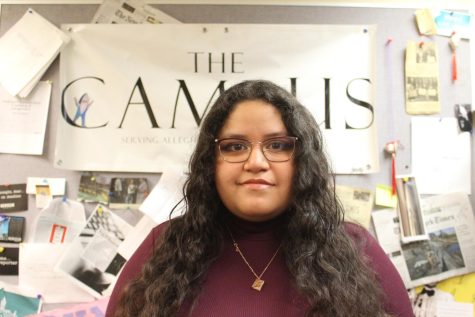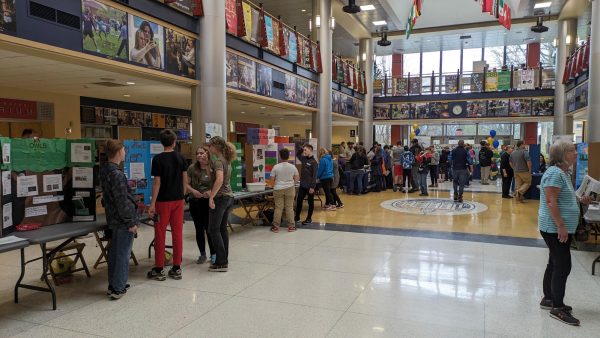One Love hosts workshop on healthy vs. unhealthy relationships
One Love sponsored a viewing of a three-part film, “The Ghost Club,” on Wednesday, Oct. 19, in Arter Hall 212. The film is centered on providing a clear view of examples of healthy and unhealthy relationships such as friendships, sibling dynamics and couples.
One Love is one of the organizations focused on healthy relationships on campus. According to the One Love website, it aims to educate about love because it is not a subject people have enough awareness about. The organization is on multiple campuses and provides resources for students such as the lists of healthy and unhealthy signs available at the event.
“The Ghost Club” follows the lives of Aidan, Omar, Isa and Tori as they hunt for ghosts while exploring their relationships with each other. The relationships featured were the friendship between Isa and Tori, the romantic relationship between Aidan and Omar, and the sibling relationship between Isa and Aidan. Each part included examples of unhealthy dynamics and many of them did not have resolutions.
Student Ambassador for One Love Alexa Isaguirre Portillo, ’24, said the event’s purpose was to showcase what a healthy relationship is and highlight the signs of what can lead to unhealthy relationships. She said the film’s relationship problems were very obvious to the audience for the purpose of clarity and making sure students could have clear examples.
“People have commented to me that they have always learned at least one new thing from the workshop in terms of noticing the difference between communication and arguing with someone,” Portillo said. “The one we showed at the workshop was more for high schoolers and was so that students could easily identify that kind of thing but we have shown more triggering films.”
After the viewing, students were asked questions about what they understood from the film. The discussion was led by Student Ambassador Jared Contreras, ’25, and Portillo. While One Love provided the questions, Contreras and Portillo chose questions that focused the most on boundaries and communication in relationships. Students were invited to share their personal experiences and assured that whatever was said in the room would stay there.
Aria Zong, ’25, said the workshop was a positive experience for her because she was able to have a refresher on what unhealthy relationships look like and she felt comfortable sharing her experiences in the space.
“College actually is a great place to have these conversations whether you are a freshman or a senior because freshmen usually come to college and bring their relationships with them and they are more susceptible to unhealthy relationships,” Zong said. “With the film, it was very obvious to me that the group was extremely toxic and felt like they could have resolved if they had given themselves the space to communicate properly and it was a very good reminder of signs.”
Zong said the main takeaway for her came from the discussions and the handouts provided to the students because they were more in-depth about other relationship characteristics.
Leslie Briseno, ’25, shared that she has noticed that people do not really talk about what healthy relationships look like and that toxic behavior has become consistently normalized on campuses and in general.
“We don’t even really recognize unhealthy relationships on our own,” Briseno said. “It was great to have this workshop because even when you are not in a relationship, you still have relationships with friends, family and peers. It doesn’t have to be an intimate relationship so that it can be talked about.”
Briseno also appreciated that LGBTQ+ relationships were represented and were a part of the conversation.
“The film provided a good perspective on LGBT relationships and it is not something that is really talked about so I would recommend students come here to discuss these topics on campus,” Briseno said. “It benefits students to come here because they get to learn about themselves and
hear other people’s perspectives on relationships.”
Contreras explained that he joined One Love to make a difference on campus in a way that he is able to.
“It may not be a widespread impact but I feel like just helping that one person realize they are in an abusive relationship … is a very good thing,” Contreras said. “It could stop future cases of sexual assaults and domestic violence.”
Contreras said One Love is still a new organization on campus and is set to have at least one workshop per month around similar topics and go further in depth.

Evelyn Zavala is a senior from San Francisco. She is majoring in Business and minoring in Journalism in the Public Interest. This is her fourth year on...






